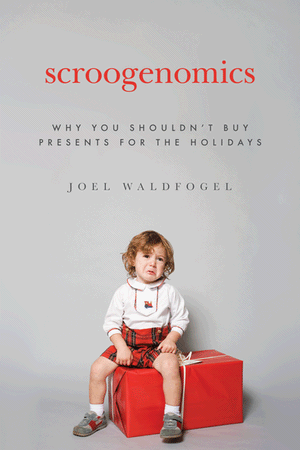 University of Pennsylvania economist Joel Waldfogel has written a book called Scroogenomics: Why You Shouldn't Buy Presents for the Holidays. The book is apparently 186 pages long, and backed by a big name publisher (Princeton University Press), but really all it's about is what everyone knows anyway: gifts are often wasteful because the receiver hardly ever values the gift as much as the giver paid for it.
University of Pennsylvania economist Joel Waldfogel has written a book called Scroogenomics: Why You Shouldn't Buy Presents for the Holidays. The book is apparently 186 pages long, and backed by a big name publisher (Princeton University Press), but really all it's about is what everyone knows anyway: gifts are often wasteful because the receiver hardly ever values the gift as much as the giver paid for it.Though the rest of the world doesn't seem to care about all this waste, Mr. Waldfogel certainly does. As he puts it in his introduction to the book, "If you discovered a government program that was hemorrhaging money—say, spending $100 billion of taxpayer money per year to generate a benefit of only $85 billion—you would be outraged. You might even email your elected representatives to demand an end to the wasteful program." To wit, Mr. Waldfogel even offers a proposal to help us make the holiday season more efficient: instead of traditional gifts, he says, we should have "gift vouchers that are designed to expire after a set period of time, with unused balances going to a charity of the giver’s choice" (The Economist).
As an economics major, books like these dismay me to no end. They're the reason that economists are seen as nothing more than miserable little bean counters (and rightly so, it seems).
Mr. Waldfogel misses the point of gift-giving completely. It's not about the stuff, it's about people. People appreciate gifts not because it saves them the time of going out to buy it themselves, but rather because it shows that the other person values their relationship. This is what is meant by "It's the thought that counts." Thus, Mr. Waldfogel has ended up writing a whole book on the inefficiency of transactions that may not even been inefficient after all. It just requires a change in perspective to realize that although people may not have spent much money on the gift themselves, they can still value it as much as (or even more than) the purchase price simply by virtue of it being a cherished gift.
Books like these make me worry about how materialist we're becoming. If we (like Mr. Waldfogel) care primarily about getting the most bang for our buck out of gifts, then it seems we're forgetting where their true value is supposed to lie.

No comments:
Post a Comment